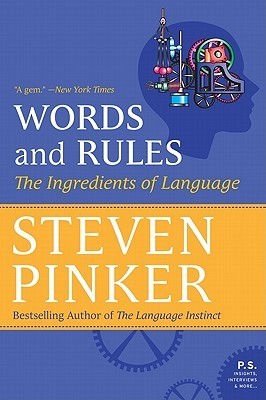What do you think?
Rate this book


How does language work? How do we learn to speak? Why do languages change? Why do they have so many quirks? What does language reveal about the mind?Steven Pinker explores the mysteries of language in this original and hugely entertaining book. Pinker uses a deceptively simple phenomenon—regular and irregular verbs—to illuminate an astonishing array of topics: the history of languages, what we can learn from children's grammatical mistakes, the genetic and neurobiological underpinnings of language, and some of the major themes in Western philosophy. The key idea—that language comprises a mental dictionary of memorized words and a mental grammar of creative rules—extends beyond language, offering insight into the nature of thinking. For fans of The Language Instinct and The Stuff of Thought, here is another cornucopia of ideas about language and mind.
370 pages, Paperback
First published October 28, 1999
This book tries to illuminate the nature of language and mind by choosing a single phenomenon and examining it from every angle imaginable. That phenomenon is regular and irregular verbs, the bane of every language student.That’s no mean goal the author has set here. At least he didn’t write “will illuminate”, because that, to me, would have been wrong. Elsewhere, however, the author was not so modest in his utterances. It seems to me that the scientific field of linguistics is not void of some strong headed individuals. In the dispute between Noam Chomsky and his early students one even spoke of Linguistics Wars , an expression I do not like at all. On the other hand it doesn’t surprise me much. Language is one of our most valuable possessions and anyone who expresses something about language that does not agree with one’s own opinion must, of course, expect a violent headwind. That’s also the reason why I read this book in the first place. Naturally, as a German native speaker, I instantly felt a little offended by the above chapter title (that is, I took the bait). But I do not want to get involved in any kind of war. In addition, this book is not about linguistics wars at all (well, maybe a little, if your read between the lines).

Children begin to learn words before their first birthday, and by their second they hoover them up at a rate of one every two hours. By the time they enter school children command 13,000 words, and then the pace picks up, because new words rain down on them from both speech and print. A typical high-school graduate knows about 60,000 words; a literate adult, perhaps twice that number.